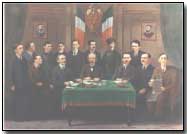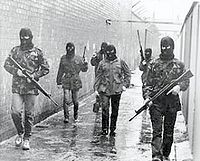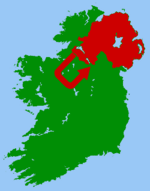Difference between revisions of "History of Anglo-Irish Conflict"
John F Baker (Talk | contribs) m |
|||
| Line 59: | Line 59: | ||
With demands for war with Ireland at fever pitch, certain members of the British parliament successfully encouraged their Minister for Foreign Affairs to propose Ireland as a natural enemy. The proposal passed with a strong majority, though was not a legal proposal under UK law. The declaration of war caused massive uproar in EDEN and Terra, with the President of the United States proposing the UK as a natural enemy as a strong protest. Canada, which was already going to help the Irish against the PTO threat, now found itself taking Irish regions to close the war, which it did successfully despite British-initiated resistance wars in Northern Ireland and Shannon. The UK then left Terra, with the US natural enemy proposal cited as proof of an irreversible breakdown of relations. There was also a feeling that Terra was becoming too close to EDEN, and with Ireland an EDEN member this was seen as unacceptable to the British government. | With demands for war with Ireland at fever pitch, certain members of the British parliament successfully encouraged their Minister for Foreign Affairs to propose Ireland as a natural enemy. The proposal passed with a strong majority, though was not a legal proposal under UK law. The declaration of war caused massive uproar in EDEN and Terra, with the President of the United States proposing the UK as a natural enemy as a strong protest. Canada, which was already going to help the Irish against the PTO threat, now found itself taking Irish regions to close the war, which it did successfully despite British-initiated resistance wars in Northern Ireland and Shannon. The UK then left Terra, with the US natural enemy proposal cited as proof of an irreversible breakdown of relations. There was also a feeling that Terra was becoming too close to EDEN, and with Ireland an EDEN member this was seen as unacceptable to the British government. | ||
| + | |||
| + | ==TEDEN Invasion of Britain== | ||
| + | ''Main article: [[TEDEN Invasion of UK]]'' | ||
| + | It is hard to define this war as either an individual war or a continuation of the last. However, considering different motives and the fact that the Second Anglo-Irish war was mechanically ended, it may be considered a new war. Taking this path, the war began on December 11th, after the UK joined ONE. On December 19th, Ireland, Canada and France invaded the UK, wiping it finally on December 24th. Ireland played a substantial part in this. The following year [[The Commonwealth Agreement]] divided up the British Isles between France and Ireland (Canada was not part of the agreement but still owns most of the former country). Ireland was given Northern Ireland and had finally defeated its greatest enemy, Britain. | ||
| + | However, resistance is still strong in Irish - held areas of Britain, meaning they are constantly passed between the resistance force, Canada and Ireland. Sometimes Ireland takes control of Scotland, Wales and occassionaly further in the country, those these areas are usually taken back by Canada. | ||
== References == | == References == | ||
Revision as of 07:28, 26 February 2012
| ||||||||||||||||||
The Anglo-Irish Conflict in eRepublik refers to ongoing diplomatic and armed conflicts between the Republic of Ireland and the United Kingdom which has its origins in the real Anglo-Irish conflicts, and the will of the Irish population to have a distinct purpose in the game. Its development in eRepublik was far from immediate, and was the result of an artificial movement from alliance to enemy. The conflict continues to this day, with relations continuing to worsen between the two countries, in sharp contrast with the past relationship.
Contents
- 1 Anglo-Irish Relations in Beta
- 2 The Irish Volunteer Force & World War I
- 3 Neutrality & The Shannon Exercise
- 4 Edana Savage and the Rise of Populist Republicanism
- 5 Aftermath, the Wipe and the Revolution
- 6 British Imperialism and World War V
- 7 Second Anglo-Irish War
- 8 TEDEN Invasion of Britain
- 9 References
Anglo-Irish Relations in Beta
Diplomatic relations between the Republic of Ireland and the United Kingdom were extremely close from the outset of the New World. Britain and Ireland shared strong bilateral ties. The two countries were also founding members of the Northern Alliance, one of the major beta alliances. The relationship has been described as the golden age of Anglo-Irish cooperation, and/or Britain expressing a paternalistic wish to support Ireland, but regardless of opinion on how, the two governments were never so strongly aligned.
The strength of the relationship between the two countries even transcended alliance ties, as shown by Britain's involvement during the Romanian Occupation of Ireland. In the dying days of the Northern Alliance, Romanian political takeover activists lead by Victor Petrescu moved to Ireland. Reluctance to act against them by key political leaders such as patton, and a lack of citizenship module prevented the Irish Government from stopping the PTO before it succeeded. The Romanian Ireland Reborn Party won the August 2008 Presidential elections, and the political party Ireland First declared a Provisional Government under ImaNewbie. This move was quickly supported by the vast majority of real eIrish, who retained control of the National Bank and government assets. The Romanians responded by destroying the eIrish economy, creating damage that would last for as long as a year by some measures.
The British response was slow to come, but British government opinion was clearly on the side of the Irish. The Romanians had occupied a fellow Northern Alliance member, and a small country aligned to Britain at that. British paratroops were deployed to vote against Victor Petrescu, but history intervened, and Romania declared war on Hungary. The Irish elected ImaNewbie in a landslide while World War I raged. Both the Romanians and the British went to fight against Hungary, while the Irish government sat on the sidelines.
However, the latent Republican minority was solidifying around the strong anti-Romanian sentiment in the country.
The Irish Volunteer Force & World War I
The Irish Volunteer Force, or IVF, formed from various Republican groupings present in Ireland in August '08, and was officially founded on September 23rd. It was Ireland's first unified Republican movement and one of the first paramilitaries formed for a political purpose. Its scope was not merely Irish Republican, with several leaders aiding South African Independence League and other resistance movements worldwide. Formed due to a frustration with the Anglo-Irish position for a variety of real and in-game reasons, the organisation proceeded to openly recruit for warfare against Britain. It also started its own political wing, the Irish Socialist Republican Party, which would dominate Irish politics in the spring and summer of 2009. It would not be long before the first chapter in Anglo-Irish military conflict would be written by the IVF.
With the Irish government refusing to act against Romanian aggression in Hungary, and with Britain supporting Romania, the IVF Army Council decided to send its small guerrilla force to Hungary. Moving tickets were secured from the Hungarian government, and the IVF deployed to Gyor, Hungary where it served disproportionately well to its size. At this point, talking about a united Ireland was tantamount to political suicide, never mind actually fighting the British on a battlefield, and the IVF were considered extremists. After World War I, the IVF continued in various forms, becoming a much more political organisation, and operating under the name of the eIRB for many months lead by Igor Thunderbrow, as the IRA faction fell out of activity. The political significance of the Republican movement has its origins in the IVF, and was to grow slowly from this core stage over a year.
Neutrality & The Shannon Exercise
When World War I started, two alliances were hastily formed to represent the new lay of the land.
ATLANTIS, formed by former members of the Northern Alliance, PANAM and the Med Alliance, including Britain, the US and Romania.
PEACE, formed by FIST members mostly, including Hungary and the Holy Empire of Pakistan.
The world was plunged into endless intercontinental war that continues to this day, and the Irish government, seeing itself as too small a country to get involved and its borders safe due to ATLANTIS on all sides, took a neutral position. This was the first political action by the government that ultimately toppled Anglo-Irish relations, as the alliance comradeship that would have been gained between the two countries did not develop. Instead, an independent treaty of no real consequence was drawn up. Britain dived into the international military scene, while Ireland was content to run training wars. Meanwhile, the Irish Republican movement continued to agitate to no great effect beyond increasing its political profile.
This situation continued for months, until Nithraldur was re-elected on his third mandate for President of Ireland. The population were complaining about boredom, and the President started cooking up a plan to solve the problem. On June 18th 2009, British forces crossed the border with Northern Ireland into Shannon, shocking the Irish people. The Irish Defence Forces, whom were heavily disorganised at the time, fought to defend the country. However, it soon became apparent that the attack was a trick by the presidents of both countries. Nithraldur immediately received both flak and praise for his move, as he exposed how disorganised the Irish military was, but also exposed the country to attack. However, the long term effect of the Exercise was to increase the militarism of the country with regard to Britain, and Republican politics grew particularly strong in the months afterwards, with the IVF reviving its activities strongly. The whole affair is by far the most significant political action by an Irish government until January 2010.
Edana Savage and the Rise of Populist Republicanism
Anglo-Irish relations went from stagnant to hostile in the period between the Shannon Exercise and the beginning of World War IV. By this point, Britain had fallen out with the United States and Canada on controversial grounds, and found itself attacked by the Brolliance and EDEN respectively. Meanwhile, Edana Savage was elected to the office of Taoiseach in Ireland on a relatively conservative ticket. However, there was a mess brewing in the British foreign affairs department, as the Dishmcds administration condemned the Raleigh Treaty, a long standing agreement between the two countries on defence and diplomacy, due to the Irish government wishing to remain neutral. This caused great uproar in Ireland, but little in Britain due to a coordinated military offensive against the country by EDEN and the Brolliance which reduced the UK to one region, London. During this offensive, the Norweigans took Northern Ireland from the UK. Seeing a chance, the Irish republican bloc immediately demanded that the region be liberated and held, in light of British diplomatic hostility and a perfect opportunity to halt the boredom effects of complete neutrality. The Irish government was more cautious, but the Taoiseach was eventually persuaded by Donovan Thomas, a prominent soldier in the Irish Defence Forces, to attack. Meanwhile, the President of the United States Josh Frost and EDEN signed peace treaties with the UK, much to the annoyance of both the Irish and citizens within countries who had been fighting against Britain. Despite the truce that was imminent, Ireland successfully invaded Norweigan-held on February 13th and held it until the 26th, when British forces called up Serbian allies to aid with a second resistance war, after the first failed due to significant support for Ireland from abroad.
Aftermath, the Wipe and the Revolution
From this point on, Ireland's political scene changed significantly. Ireland joined the Brolliance in April 2010, cementing its alignment to the Western bloc of alliances and ending a very long period of neutrality. Republican ideas took a new role as the dominant political force in the country. Ireland would participate in military actions against Britain from February 2010 until January 2011, when Ireland was wiped by British and Serbian forces after supporting a general offensive against the UK by seizing Wales and the West Midlands. The wipe caused the Irish Revolution of 2011, a major shift in Irish political, economic and military life.
British Imperialism and World War V
For four months after the wipe, Ireland concentrated on building up its military and diplomatic credentials, joining EDEN and fighting all over the world against ONE. Britain, having joined Terra supposedly on the condition that it would be allowed to invade Ireland whenever it wanted, found itself allied indirectly to the Irish. World War V had broken out, and both alliances were under immense pressure. At the same time, the Bremen Clubhouse, a troll group mostly from the United Kingdom, started a PTO project in Ireland.
During this conflict, the British started to develop a wish to occupy some land, and to be able to directly help occupied France and Germany fight Poland, largely due to boredom due to a lack of military action. As such, they invaded Belgium despite ongoing battles in defence of France and Brazil. The Irish Citizen Army, the spiritual successor to the IVF, deployed its forces against the British invasion to great success, helping to repel the occupations and even aiding a short counterattack. The Irish Government at the time, lead by Ariovistus, claimed to condemn the intervention of the ICA, but tensions with Britain remained high. Further ICA action against British interests due to ongoing friendly relations between Serbia and the United Kingdom, such as fighting in resistance wars in Serbian-rented regions within the UK, kept the temperature between the two countries cold.
Second Anglo-Irish War
Main article: Second Anglo-Irish War
With demands for war with Ireland at fever pitch, certain members of the British parliament successfully encouraged their Minister for Foreign Affairs to propose Ireland as a natural enemy. The proposal passed with a strong majority, though was not a legal proposal under UK law. The declaration of war caused massive uproar in EDEN and Terra, with the President of the United States proposing the UK as a natural enemy as a strong protest. Canada, which was already going to help the Irish against the PTO threat, now found itself taking Irish regions to close the war, which it did successfully despite British-initiated resistance wars in Northern Ireland and Shannon. The UK then left Terra, with the US natural enemy proposal cited as proof of an irreversible breakdown of relations. There was also a feeling that Terra was becoming too close to EDEN, and with Ireland an EDEN member this was seen as unacceptable to the British government.
TEDEN Invasion of Britain
Main article: TEDEN Invasion of UK It is hard to define this war as either an individual war or a continuation of the last. However, considering different motives and the fact that the Second Anglo-Irish war was mechanically ended, it may be considered a new war. Taking this path, the war began on December 11th, after the UK joined ONE. On December 19th, Ireland, Canada and France invaded the UK, wiping it finally on December 24th. Ireland played a substantial part in this. The following year The Commonwealth Agreement divided up the British Isles between France and Ireland (Canada was not part of the agreement but still owns most of the former country). Ireland was given Northern Ireland and had finally defeated its greatest enemy, Britain. However, resistance is still strong in Irish - held areas of Britain, meaning they are constantly passed between the resistance force, Canada and Ireland. Sometimes Ireland takes control of Scotland, Wales and occassionaly further in the country, those these areas are usually taken back by Canada.



